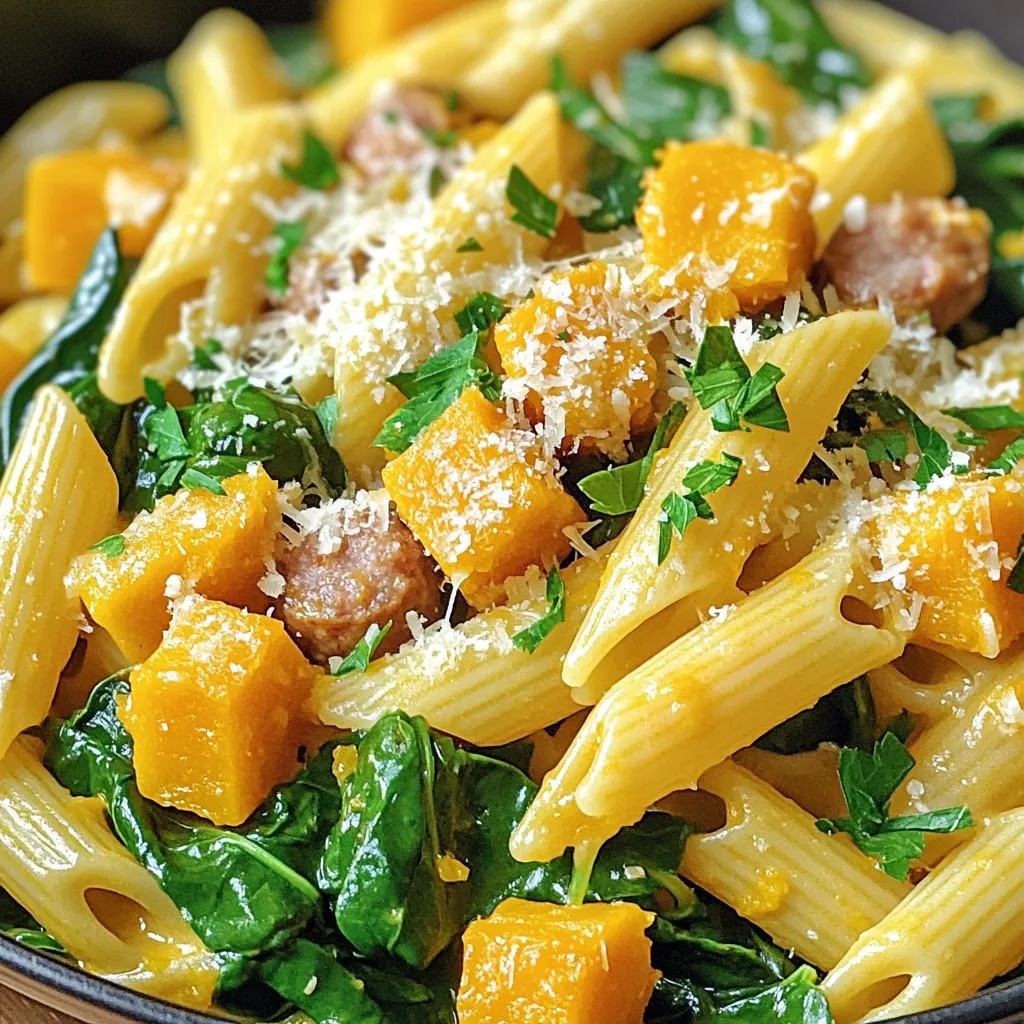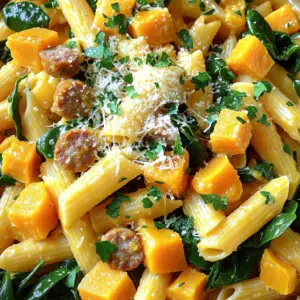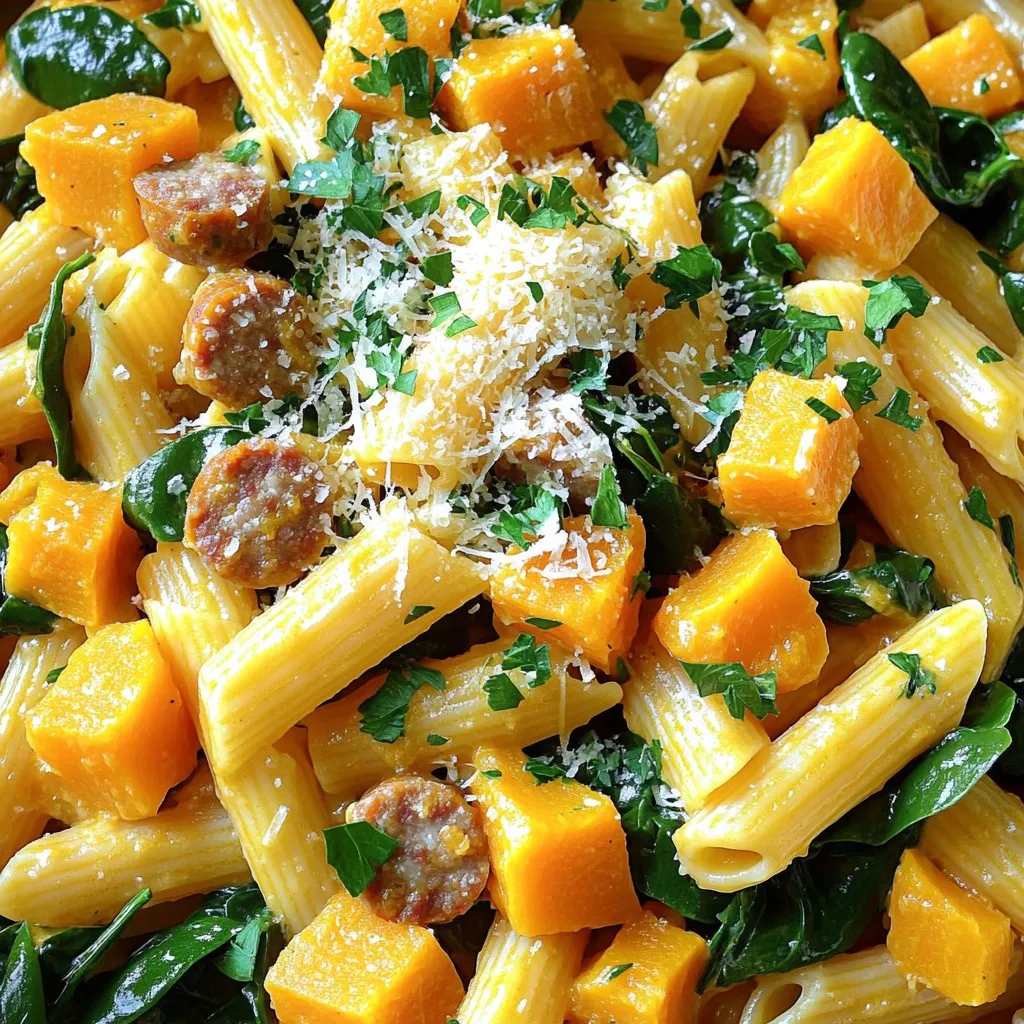Fall flavors shine in this Autumn Sausage Squash Pasta. You’ll love how simply you can combine hearty Italian sausage with roasted butternut squash for a warm meal. With fresh greens and a creamy sauce, this dish delivers taste and comfort. Join me as we explore easy steps and tips for creating a delightful and satisfying dinner that embodies the spirit of autumn!
Ingredients
Main Ingredients
– Pasta options: You can use 8 oz of penne or fusilli. Both are great choices.
– Types of Italian sausage: Choose between 1 lb of mild or spicy Italian sausage. Casings should be removed for easy cooking.
– Butternut squash preparation: Peel and cube 1 medium butternut squash. This adds a sweet touch.
Additional Ingredients
– Fresh spinach: Use 2 cups of fresh spinach. It adds color and nutrients.
– Aromatics: Mince 2 cloves of garlic and dice 1 small onion. These add depth to the flavor.
– Herbs and spices: Use 1 teaspoon each of dried thyme and dried sage. Add 1/2 teaspoon of red pepper flakes if you like heat.
Cream and Cheese
– Heavy cream vs. coconut cream: Use 1/4 cup of heavy cream for richness. Coconut cream works for a dairy-free option.
– Parmesan cheese alternatives: Grate 1/2 cup of Parmesan cheese. Nutritional yeast is a good dairy-free substitute.
– Seasonings: Add salt and pepper to taste. These will bring all the flavors together.
Step-by-Step Instructions
Cooking the Pasta
Start by boiling a large pot of salted water. Use enough water to let the pasta move freely. Add the pasta and cook it according to the package directions until it is al dente. This usually takes about 8 to 12 minutes. Once it is done, drain the pasta, but reserve about 1 cup of that pasta water. This water is starchy and will help thicken your sauce later.
Roasting the Squash
Preheat your oven to 400°F (200°C). While the oven heats, take your butternut squash and peel it. Cut it into small cubes. Toss the cubes with 1 tablespoon of olive oil, salt, and pepper. Spread the squash out in a single layer on a baking sheet. Roast it for 20 to 25 minutes. You want it to be tender and slightly caramelized, which adds a sweet flavor.
Browning the Sausage
While the squash roasts, heat a large skillet over medium heat. Add the remaining tablespoon of olive oil. Once the oil is hot, add the diced onion. Sauté it for about 3 minutes until it softens. Then, add the minced garlic and cook for 1 more minute. The garlic should smell fragrant. Next, increase the heat to medium-high and add the Italian sausage. Break it apart with a spatula. Cook until it is browned and fully cooked, about 5 to 7 minutes. Stir in the dried thyme, sage, and red pepper flakes if you like some heat.
Combining Ingredients
Now that the sausage is cooked, add the roasted butternut squash to the skillet. Stir it in well. Next, add the fresh spinach to the pan. Let it wilt down for 1 to 2 minutes. The spinach will cook down quickly and add great flavor to your dish.
Creating the Sauce
Lower the heat to medium-low. Pour in the heavy cream, mixing it thoroughly with the sausage and squash. If the sauce seems too thick, gradually add some of the reserved pasta water. This will help you reach your desired sauce consistency.
Mixing with Pasta
Finally, add the cooked pasta to the skillet. Toss everything together gently. Make sure all the pasta is well-coated in that creamy sauce. Taste and adjust the seasoning with salt and pepper as needed. This step makes the flavors pop and ties the whole dish together.
Tips & Tricks
Cooking Variations
– Adjusting spice levels: You can make this dish mild or spicy. If you want mild, use sweet Italian sausage. For more heat, choose spicy sausage and add red pepper flakes. Adjust to fit your taste.
– Using different types of pasta: You can switch the pasta type. Penne and fusilli work great, but feel free to try spaghetti or even whole wheat pasta. Just cook them according to the package.
Ingredient Substitutes
– Dairy-free options: If you want to avoid dairy, use coconut cream instead of heavy cream. For cheese, nutritional yeast is a tasty choice that gives a cheesy flavor.
– Seasonal ingredient swaps: Use other fall vegetables like acorn squash or kale. They add great flavor and nutrition. Swap as you prefer to keep it fresh and fun!
Enhancing Flavors
– Additional herbs or spices: You can add more herbs like rosemary or basil for extra depth. A pinch of nutmeg can also enhance the squash’s sweetness.
– Flavor boost methods: Try adding a splash of white wine to the skillet after cooking the sausage. This adds a rich flavor. You can also use chicken or vegetable broth instead of water for a more savory sauce.

Variations
Vegetarian Version
You can make a tasty vegetarian version of this dish. Replace the sausage with plant-based options, like lentil or tempeh. These substitutes add protein and texture. Keep the flavor strong by using plenty of vegetables. Try mushrooms, bell peppers, or zucchini. These veggies blend well with the squash and spices.
Gluten-Free Version
For a gluten-free version, swap regular pasta for lentil or chickpea pasta. These options are high in protein and taste great. When cooking gluten-free pasta, follow the package instructions closely. Gluten-free pasta can cook faster than usual, so stay alert. Rinse it with cool water after draining to prevent sticking.
Adding Extra Veggies
You can add more seasonal veggies to boost nutrition and flavor. Consider kale, Brussels sprouts, or carrots. Just chop them into small pieces for even cooking. Add these extra veggies when you combine the sausage and squash. This way, they will cook without changing the dish’s main taste.
Storage Info
Storing Leftovers
To keep your Autumn Sausage Squash Pasta fresh, use airtight containers. Glass containers work well since they don’t stain. You can also use BPA-free plastic containers. Store the pasta in the fridge for up to three days. If you want to keep it longer, freeze it for up to three months.
Reheating Tips
When reheating, you can use a microwave or stovetop. For the microwave, place the pasta in a bowl, cover it, and heat it for 1-2 minutes. Stir halfway through to heat evenly. For the stovetop, warm a skillet over low heat. Add a splash of water or cream to keep it moist. Stir often to prevent sticking.
Preventing Spoilage
Check for signs of spoilage in stored pasta. Look for mold or an off smell. If it smells sour or looks dry, it’s best to toss it. To maintain flavor, store it in a cool, dark place. Avoid leaving it out at room temperature for long. This keeps your meal tasty for days.
FAQs
How do I make sure my pasta is al dente?
To cook pasta al dente, follow the package directions closely. Al dente means the pasta is firm but not hard. For most pasta, this takes about 8 to 12 minutes. Start checking it a minute or two before the time listed.
Salt your water well before adding the pasta. This helps the pasta absorb flavor. Use about 1 to 2 tablespoons of salt per 4 quarts of water. This small step makes a big difference in taste.
Can I use butternut squash puree instead?
Yes, you can use butternut squash puree. It works well if you want a smoother sauce. To substitute, use about 1 to 1.5 cups of puree.
Reduce the cream slightly since puree is thicker. You may also want to add a bit of broth or water for a lighter sauce. Taste and adjust the seasonings as needed.
What can I serve with Autumn Sausage Squash Pasta?
This dish pairs well with fresh green salads. A simple arugula salad with lemon dressing is great. You can also serve it with garlic bread for a crunchy side.
For drinks, consider a crisp white wine like Sauvignon Blanc. A sparkling apple cider also complements the flavors well.
Is this recipe suitable for meal prep?
Absolutely! This recipe is great for meal prep. You can cook a big batch and store it for later.
Use airtight containers to keep it fresh. It will last in the fridge for up to 4 days. For longer storage, freeze it in portions. When reheating, add a splash of water to keep it moist.
In this post, we explored a delicious Autumn Sausage Squash Pasta recipe. We covered key ingredients, like pasta, sausage, and butternut squash, plus tips for great flavor. You learned about cooking methods and storage tips to keep your meal fresh.
Final thoughts: Whether you choose a vegetarian version or adjust spices, this dish is versatile. Experiment with flavors to make it your own. Enjoying this meal brings comfort and warmth to any table.

